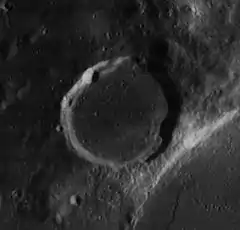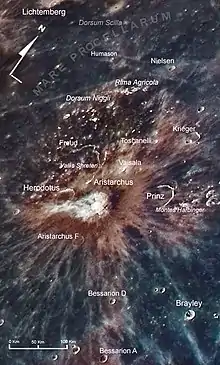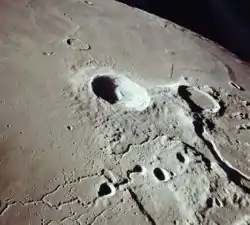Herodotus (crater)
Herodotus is a lunar impact crater located on a low shelf in the midst of the Oceanus Procellarum. To the east is the slightly larger crater Aristarchus. West across the mare is Schiaparelli. Almost due south on the mare surface is a solitary lunar dome designated Herodotus Omega (ω).
 Lunar Orbiter 4 image | |
| Coordinates | 23.2°N 49.7°W |
|---|---|
| Diameter | 35 km |
| Depth | 1.5 km |
| Colongitude | 49° at sunrise |
| Eponym | Herodotus |


The crater Herodotus has a slightly irregular, narrow rim that appears somewhat oblong due to foreshortening. The inner floor has been flooded with lava, and has a lower albedo than its brighter and more prominent neighbor Aristarchus. There is a small craterlet overlapping the northwest rim, but otherwise the outer wall has not suffered significant wear. Nevertheless, the rim is unusually thin in relation to its size.
To the north of Herodotus is the start of the Vallis Schröteri, a valley that has a length of 160 kilometers and a maximum depth of nearly a kilometer. It begins at a small crater 25 km north of the rim, then winds across the surface to the north, before turning northwest and finally to the southwest before coming to a precipitous end at the edge of the raised shelf on which Herodotus is located. The valley is wider at its crater head than elsewhere, which has given it the nickname of the "Cobra Head".
Satellite craters
By convention these features are identified on lunar maps by placing the letter on the side of the crater midpoint that is closest to Herodotus.[1]
| Herodotus | Latitude | Longitude | Diameter |
|---|---|---|---|
| A | 21.5° N | 52.0° W | 10 km |
| B | 22.6° N | 55.4° W | 6 km |
| C | 21.9° N | 55.0° W | 5 km |
| E | 29.5° N | 51.8° W | 48 km |
| G | 24.7° N | 50.2° W | 4 km |
| H | 26.8° N | 50.0° W | 6 km |
| K | 24.5° N | 51.9° W | 5 km |
| L | 26.1° N | 53.2° W | 4 km |
| N | 23.7° N | 50.0° W | 4 km |
| R | 27.3° N | 53.9° W | 4 km |
| S | 27.7° N | 53.4° W | 4 km |
| T | 27.9° N | 53.8° W | 5 km |
The following craters have been renamed by the IAU.
- Herodotus D — See Raman.
References
- Jonathan McDowell (2007). "Moon Nomenclature: Satellite Feature". Gazetteer of Planetary Nomenclature. Retrieved 4 August 2009.
- Andersson, L. E.; Whitaker, E. A. (1982). NASA Catalogue of Lunar Nomenclature. NASA RP-1097.
- Blue, Jennifer (July 25, 2007). "Gazetteer of Planetary Nomenclature". USGS. Retrieved 2007-08-05.
- Bussey, B.; Spudis, P. (2004). The Clementine Atlas of the Moon. New York: Cambridge University Press. ISBN 978-0-521-81528-4.
- Cocks, Elijah E.; Cocks, Josiah C. (1995). Who's Who on the Moon: A Biographical Dictionary of Lunar Nomenclature. Tudor Publishers. ISBN 978-0-936389-27-1.
- McDowell, Jonathan (July 15, 2007). "Lunar Nomenclature". Jonathan's Space Report. Retrieved 2007-10-24.
- Menzel, D. H.; Minnaert, M.; Levin, B.; Dollfus, A.; Bell, B. (1971). "Report on Lunar Nomenclature by the Working Group of Commission 17 of the IAU". Space Science Reviews. 12 (2): 136–186. Bibcode:1971SSRv...12..136M. doi:10.1007/BF00171763. S2CID 122125855.
- Moore, Patrick (2001). On the Moon. Sterling Publishing Co. ISBN 978-0-304-35469-6.
- Price, Fred W. (1988). The Moon Observer's Handbook. Cambridge University Press. ISBN 978-0-521-33500-3.
- Rükl, Antonín (1990). Atlas of the Moon. Kalmbach Books. ISBN 978-0-913135-17-4.
- Webb, Rev. T. W. (1962). Celestial Objects for Common Telescopes (6th revised ed.). Dover. ISBN 978-0-486-20917-3.
- Whitaker, Ewen A. (1999). Mapping and Naming the Moon. Cambridge University Press. ISBN 978-0-521-62248-6.
- Wlasuk, Peter T. (2000). Observing the Moon. Springer. ISBN 978-1-85233-193-1.
